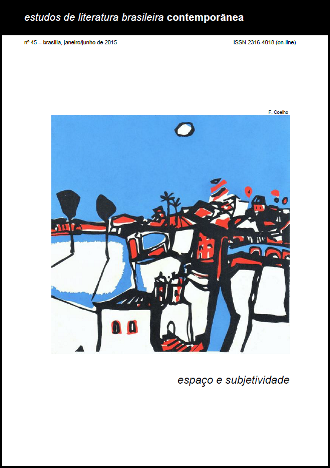Cenas cotidianas:
cultura de consumo e mídia em contos de André Sant’Anna
DOI:
https://doi.org/10.1590/2316-40184514Abstract
Este artigo propõe uma análise da representação da cultura de massas e da cultura de consumo em relatos de Sexo e amizade, do escritor brasileiro André Sant’Anna. Situamos estes relatos no fluxo de um extenso diálogo da literatura brasileira com a cultura de massas, o qual tem se efetivado desde o início do século XX e através do qual a literatura brasileira tem, com frequência, elaborado uma crítica à cultura de consumo. Argumentamos que, nos textos em questão, Sant’Anna representa a cultura de consumo como uma força intrinsecamente presente nas relações sociais e na forma de pensar dos personagens. Afastando-se do que Lidia Santos chama de estética da dificuldade, uma marca comum da literatura brasileira que se engaja com esse tema entre os anos 1960 e 1980, André Sant’Anna articula uma crítica da presença da cultura de consumo no cotidiano brasileiro a partir de uma linguagem predominantemente midiática e acessível, retratando indivíduos oriundos de diferentes classes sociais.
Downloads
References
ADORNO, Theodor W. (1990). Cultural industry redonsidered. In: ALEXANDER, Jeffrey C.; SEIDMAN, Steven. Culture and society: contemporary debates. Cambridge.
BEZERRA, Ligia Cristine de Morais (2003). Tropicalismos na música popular brasileira: um olhar interdiscursivo sobre a geração de 1990. Dissertação (Mestrado em Linguística) ”“ Universidade Federal do Ceará (UFC), Fortaleza.
BOURDIEU, Pierre (1984). Distinction: a social critique of the judgment of taste. Tradução de Richard Nice. Cambridge: Harvard University Press.
CANCLINI, Néstor García (2001). Consumers as citizens: globalization and multicultural conflicts. Tradução de George Yúdice. Minneapolis: University of Minnesota Press.
FELSKI, Rita (2000). The invention of everyday life. New Formations, n. 39, p. 15-31.
HUYSSEN, Andreas (1986). After the great divide: modernism, mass culture, postmodernism. Bloomington: Indiana University Press.
JAMESON, Fredric (1991). Postmodernism, or the cultural logic of late capitalism. Durham: Duke University Press.
LEFEBVRE, Henri (2002). Critique of everyday life. Tradução de John Moore. London: Verso. v. 2 (Foundations for a sociology of the everyday).
MARTÃN-BARBERO, Jesús (1993). Communication, culture and hegemony: from the media to mediations. Tradução de Elizabeth Fox e Robert A. White. London: Sage Publications.
MORIN, Edgar (1967). La indústria cultural. Tradução de Susana Constante. In: ADORNO, Theodor W.; MORIN, Edgard. La indústria cultural. Buenos Aires: Galera.
SALLES, Walter (1998). Central do Brasil. Le Studio Canal.
SALLES, Walter (2004). Diários de motocicleta. FilmFour.
SALLES, Walter. (2012) On the road. American Zoetrope.
SANT’ANNA, André (2007). Sexo e amizade. São Paulo: Companhia das Letras.
SANTOS, Lidia (2006). Tropical kitsch: media in Latin American literature and art. Tradução de Elisabeth Enenbach. Princeton: Markus Weiner.
Downloads
Published
How to Cite
Issue
Section
License
Authors who publish in this journal agree to the following terms:
a) The authors maintain the copyright and grant the journal the right of first publication, the work being simultaneously licensed under the Creative Commons Attribution License-Non Commercial 4.0 which allows the sharing of the work with acknowledgment of the authorship of the work and publication this journal.
b) Authors are authorized to enter into additional contracts separately, for non-exclusive distribution of the version of the work published in this journal (eg publish in institutional repository or as a book chapter), with authorship recognition and publication in this journal.
c) Authors are allowed and encouraged to publish and distribute their work online (eg in institutional repositories or on their personal page) after the editorial process, as this can generate productive changes, as well as increase the impact and citation of published work (See The Effect of Free Access).
d) The authors of the approved works authorize the magazine to, after publication, transfer its content for reproduction in content crawlers, virtual libraries and the like.
e) The authors assume that the texts submitted to the publication are of their original creation, being fully responsible for their content in the event of possible opposition by third parties.


